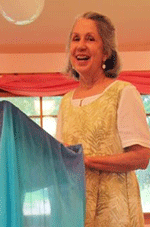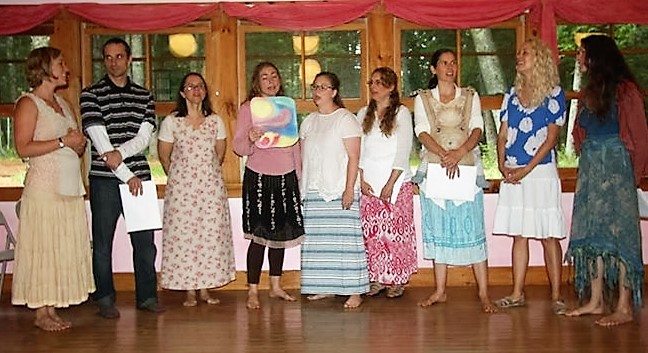 Commencement Address by Susan Silverio at the LifeWays Early Childhood Training Graduation, July 18, 2015, Rockport, Maine
Commencement Address by Susan Silverio at the LifeWays Early Childhood Training Graduation, July 18, 2015, Rockport, Maine
Life is good!
How do we know that?
There are many opportunities here in Maine to experience all that a T-shirt can proclaim as goodness. I hope that you all have had many moments during these summer sessions to be near the water or around a campfire, to share food and to be at play.
Here in New England, we also have the heritage of the transcendentalists, like Ralph Waldo Emerson, who recognized another layer of life and goodness that he called the ‘Over-soul’ that radiates around us and in which we can participate. A. Bronson Alcott was one. He created schools for grade school children and taught with conversation. Some were recorded in 1836. One day his lesson was based on Matthew’s story of the Magi coming to worship the newborn king in Bethlehem:
“Mr. Alcott broadened the story, stating that all wise men reverence newborn children, and asking, ‘Have any of you been worshipped?’
The children laughed and one student, Francis replied, ‘Only by our mothers.’
Mr. Alcott inquired, ‘In what sense should a babe be worshipped? How should it be?’
Another student, Lucia responded, ‘By being taken care of, and thought about and loved with a spiritual love.’
Mr. Alcott: ‘Has the babe itself any love from God?’
Lucia: ‘Love came with it from heaven.’
Mr. Alcott: ‘What must be done with this love?’
Lucia: ‘It must be made to grow out.’
Mr. Alcott: ‘How can love be made to grow out?’
Lucia: ‘By loving it first.’[i]
We can find the same affirmation of goodness in the early Celtic writers like Pelagius who asserted that a young soul arrives in the state of Original Blessing, and that ALL is the Triune God. We might say ‘Gaia.’
Yes, we know that there is terrible suffering in the world. Many have been broken by it. But in choosing to step aside just a bit from the world and create a sanctuary where young children can be cared for, and be at play, you are choosing to build the foundation for good to ‘grow out’ into the world.
It is the highest calling, I believe; a true priesthood. Not the priest who stands at the altar and lifts the bread and cup, lifting us as adults back to the spiritual world. Rather, our vestment is the apron. We sit with the children and knead the bread dough, transforming substance and leading the souls of the children to earth; to incarnate into their bodies as fully human individual beings. This work demands the best of us. Not one gesture is wasted on a young child. One day in the kindergarten, when I was concentrating on something (or was I worried or fearful?) a child asked me, ‘Why is your face down?’ He looked worried and fearful! How do I answer that question?
We can’t always radiate happiness, but let’s pray for the kind of love in our hearts that will drive out our fears.
Young children can read us like a book, seeing our inmost thoughts. Have you ever experienced this? Have you ever seen yourself mirrored by a child? We can truly be frightened by our own shadow and crawl into a hole! None of us is perfect. But if children see that we are striving to do our best, and to be our best, renewing our commitment daily to bring order, harmony and beauty to our world, then they forgive our imperfections and are inspired. And ‘love grows out of them.’
I have been inspired by the five classes of LifeWays students with whom I have worked. I will mention just one student from a few years ago. She had worked with Mother Teresa in India. She reflected, ‘When I was young, I wanted to change the world. Now I have found the work that does that. And it begins with changing me, renewing myself, each day.’
We have the verse that invokes that renewal, but before speaking it, I would like to focus on one of its words that can be a stumbling block to our modern minds. The word is selfless. We won’t find the word selfless depicted on a T-shirt. So how can we understand it? In her response to Mr. Alcott, Lucia spoke about loving the baby with a ‘spiritual love.’ Would not a ‘spiritual love’ by its nature be selfless?
Perhaps it is ironic that to cultivate the selflessness necessary for this work, you as LifeWays students have had to carve out these weeks for yourselves, to learn to care for yourselves, to sing, to move…! Of course it is your families who have helped make this possible. We thank and applaud them for letting you go and supporting you through this process!
So what is the nature of this selflessness that is required for this work; this way of life that enables us to receive the children with reverence into our care? The poet Rumi describes it this way:
I look for someone simple and open enough to see the Friend.
Not an intelligence weighing several perspectives.
I want an empty shell to hold this pearl.
Soon you will be returning to daily life. We know that daily life/family life is filled with nitty-gritty. While you have been in training sessions, your dear ones have been covering for you. Now you return to take up what is known as ‘real life.’ (Dear families, please be patient with them.) Rumi’s poem continues:
I want one who can quit seeing (herself),
Fill with God,
And instead of being irritated by interruption and daily resentments,
Feel those as kindness.
 Yes, life brings interruptions and daily resentments, but this is how a shellfish creates a pearl, as if by filling with the luminosity of God and wrapping the irritation in kindness.
Yes, life brings interruptions and daily resentments, but this is how a shellfish creates a pearl, as if by filling with the luminosity of God and wrapping the irritation in kindness.
So with that understanding of selflessness, let us close (or let us commence!) with this verse from Rudolf Steiner:
May wisdom shine through you.
May love glow in you.
May strength permeate you,
That in you may arise
A helper of humanity
A servant of holy things
Selfless and true.
Yea, so be it!
Susan Silverio taught Ashwood/Spindlewood Waldorf Kindergarten for 28 years, and directed and taught LifeWays Early Childhood Training in New England for 8 years. She credits her teachers, Joan Almon and Cynthia Aldinger.
